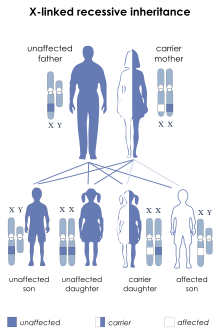| XMEN disease | |
|---|---|
| Other names | Combined immunodeficiency due to MAGT1 deficiency |
 | |
| X-linked recessive is the manner in which this condition is inherited. | |
XMEN disease is a rare genetic disorder of the immune system that illustrates the role of glycosylation in the function of the immune system. XMEN stands for “X-linked MAGT1 deficiency with increased susceptibility to Epstein–Barr virus (EBV) infection and N-linked glycosylation defect.[1]” The disease is characterized by CD4 lymphopenia, severe chronic viral infections, and defective T-lymphocyte activation. Investigators in the laboratory of Dr. Michael Lenardo, National Institute of Allergy and Infectious Diseases at the National Institutes of Health first described this condition in 2011.[2][3][4]
- ^ Cite error: The named reference
:2was invoked but never defined (see the help page). - ^ Li FY, Chaigne-Delalande B, Kanellopoulou C, Davis JC, Matthews HF, Douek DC, et al. (July 2011). "Second messenger role for Mg2+ revealed by human T-cell immunodeficiency". Nature. 475 (7357): 471–6. doi:10.1038/nature10246. PMC 3159560. PMID 21796205.
- ^ Chaigne-Delalande B, Li FY, O'Connor GM, Lukacs MJ, Jiang P, Zheng L, et al. (July 2013). "Mg2+ regulates cytotoxic functions of NK and CD8 T cells in chronic EBV infection through NKG2D". Science. 341 (6142): 186–91. Bibcode:2013Sci...341..186C. doi:10.1126/science.1240094. PMC 3894782. PMID 23846901.
- ^ Li FY, Chaigne-Delalande B, Su H, Uzel G, Matthews H, Lenardo MJ (April 2014). "XMEN disease: a new primary immunodeficiency affecting Mg2+ regulation of immunity against Epstein-Barr virus". Blood. 123 (14): 2148–52. doi:10.1182/blood-2013-11-538686. PMC 3975255. PMID 24550228.